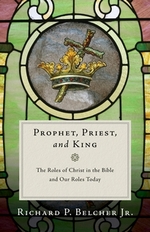 Prophet, Priest, and King: The Roles of Christ in the Bible and Our Roles Today
Prophet, Priest, and King: The Roles of Christ in the Bible and Our Roles Today
eARC, 224 pg.
P&R Publishing, 2016
Read: September 11 – 25, 2016

Throughout Church History, however varying in degree, theologians have focuses on the offices of Jesus Christ as Prophet, Priest and King. The present is probably one of those period that doesn’t emphasize them too much — at least, not the Prophet and King (even as Presbyterian and Reformed children recite them in their catechisms). It’s probably time for us to take another look at them in detail. This is Belcher’s aim, at least. As he says,
This book will address the work of Christ in light of the roles of Prophet, Priest, and King and will then draw out implications for the church.
(I’d originally spent 2 or 3 sentences saying that, when I spotted it in his opening paragraphs — always go with pithy).
That’s pretty much the book, after the introductory chapter, setting the stage, Belcher examines each office in turn, a chapter on the Old Testament definition, history and development of the office, followed by a chapter on Christ’s fulfillment of the office during his estate of humiliation, and then in his estate of exaltation.
A redemptive-historical approach— emphasizing Christ’s fulfillment of the Old Testament —naturally lends itself to connecting with the roles, not just for Christ but also for his body, the church. This approach also has implications for preaching Christ from the Old Testament.
The examinations of the offices are very thorough, but probably not exhaustive (although they sure seem exhaustive) — I’m not sure I learned a whole lot during these chapters, but I do think that reflecting on the offices in this manner has helped me understand them more and in a deeper way as leading to Christ.
There are study questions at the end of each chapter that are a handy means of reviewing, but don’t encourage much further study and thought. But I can see where they’d be useful for a class or discussion group.
While examining the Old Testament office of King, Belcher Mention digresses for a while to examine the question “Is there a Royal Priesthood in Israel?” What does the OT mean when it talks about Kings offering sacrifices, if that’s the role of the priest. I’d wondered idly about that a time or two, but hadn’t realized how complex the question can be.
In the nation of Israel the roles of prophet, priest, and king are basically kept separate to define their meanings. But it is significant that these roles come together in both the description of Adam and Eve and the description of Israel’s mission. Thus it makes sense that the Old Testament would begin to describe the coming future ruler as carrying out the combined roles (Ps. 110; Zech. 6: 11–13). 26 These are fulfilled in Christ, who is Prophet, Priest, and King during his earthly ministry. He fulfills them in his work of salvation and continues in these roles on behalf of his people in his ascension. The work of Christ lays the basis for restoring these roles to human beings in their service to God, to the church, and to the world.
Therefore, the final chapter looks at how The Church can fulfill her mission via these roles. I found this chapter fascinating — easily the best in the book. It, too, is not exhaustive, but merely outlines the ways The Church (as a whole and as individuals) can function. I wish almost everything in this chapter had been more developed and explored.
This is sound, solid, careful writing. Sure, it could use some personality — but it doesn’t need it. It’s just not that engaging — but for those interested in the topic (or see a need to develop that interest), this is a good investment of time. For a careful examination of something too often ignored, this is a worthy read.
Disclaimer: I received this eARC from P&R Publishing via NetGalley in exchange for this post — thanks to both for this.
N.B.: As this was an ARC, any quotations above may be changed in the published work — I will endeavor to verify them as soon as possible.
—–




Read Irresponsibly, but please Comment Responsibly